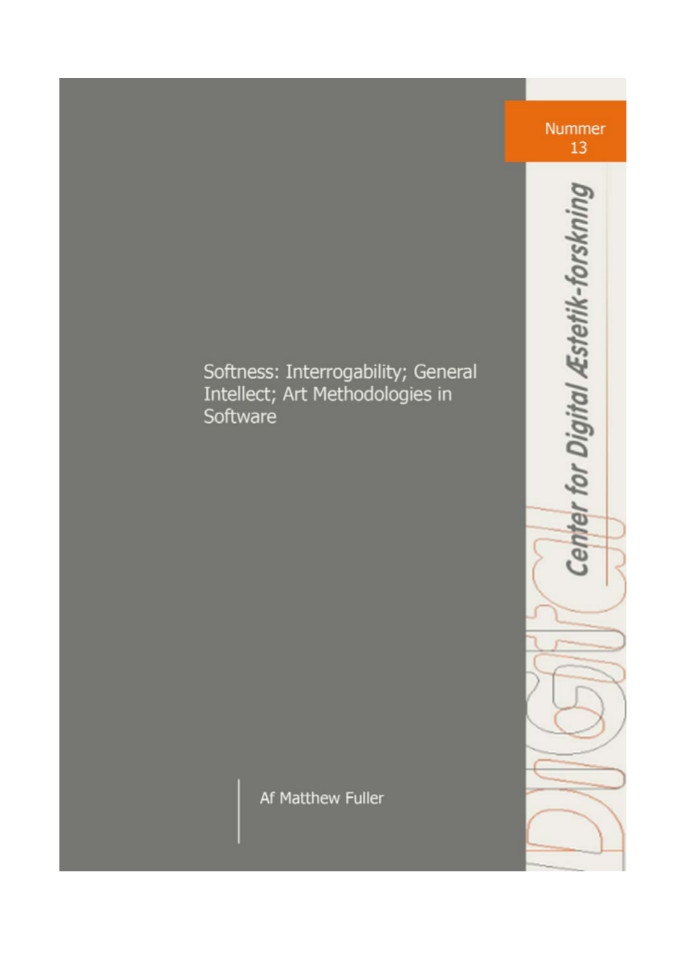Matthew Fuller: Softness: Interrogability; General Intellect; Art Methodologies in Software (2006)
Filed under pamphlet | Tags: · software, software art, software studies

This text was originally given as a talk at the ISEA (International Symposium on Electronic Art) in Helsinki in 2004. A version was published by the Digital Research Unit at Huddersfield University in 2006.
Publisher Center for Digital Æstetik-forskning, Århus, 2006
ISBN 8791810043
49 pages
PDF (updated on 2013-6-1)
PDF (alt link, updated on 2013-6-1)
Adrian Mackenzie: Cutting Code: Software and Sociality (2006)
Filed under book | Tags: · algorithm, bioinformatics, code, programming, sociology, software, software art, software studies

“Software has often been marginalized in accounts of digital cultures and network societies. Although software is everywhere, it is hard to say what it actually is. Cutting Code: Software and Sociality is one of the first books to treat software seriously as a full-blown cultural process, and as a subtly powerful material in contemporary communication. From deCSS to Java, from Linux to Extreme Programming, this book analyses software artworks, operating systems, commercial products, infrastructures and programming practices. It explores social forms, identities, materialities and power relations associated with software, and it asks how software provokes the re-thinking of production, consumption and distribution as entwined cultural processes. Cutting Code argues that analysis of code as a mosaic of algorithms, protocols, infrastructures, and programming conventions offers valuable insights into how contemporary social formations invent new kinds of personhood and new ways of acting.”
Publisher Peter Lang, 2006
ISBN 0820478237, 9780820478234
215 pages
Keywords and phrases
bioinformatics, Linux kernel, Java Virtual Machine, deCSS, extreme programming, JUnit, operating system, Sun Microsystems, CORBA, open-source software, software art, Java programming language, ontology, software development, unit tests, Linus Torvalds, RAMOSS, source code, Perl poetry, Unix philosophy
PDF (updated on 2019-12-16)
Comments (4)Matthew Fuller (ed.): Software Studies: A Lexicon (2008)
Filed under book | Tags: · algorithm, code, computing, ethnocomputing, interactivity, interface, programming, software, software art, software studies

“This collection of short expository, critical, and speculative texts offers a field guide to the cultural, political, social, and aesthetic impact of software. Computing and digital media are essential to the way we work and live, and much has been said about their influence. But the very material of software has often been left invisible. In Software Studies, computer scientists, artists, designers, cultural theorists, programmers, and others from a range of disciplines each take on a key topic in the understanding of software and the work that surrounds it. These include algorithms; logical structures; ways of thinking and doing that leak out of the domain of logic and into everyday life; the value and aesthetic judgments built into computing; programming’s own subcultures; and the tightly formulated building blocks that work to make, name, multiply, control, and interweave reality.
The growing importance of software requires a new kind of cultural theory that can understand the politics of pixels or the poetry of a loop and engage in the microanalysis of everyday digital objects. The contributors to Software Studies are both literate in computing (and involved in some way in the production of software) and active in making and theorizing culture. Software Studies offers not only studies of software but proposes an agenda for a discipline that sees software as an object of study from new perspectives.”
Contributors: Alison Adam, Wilfried Hou Je Bek, Morten Breinbjerg, Ted Byfield, Wendy Hui Kyong Chun, Geoff Cox, Florian Cramer, Cecile Crutzen, Marco Deseriis, Ron Eglash, Matthew Fuller, Andrew Goffey, Steve Goodman, Olga Goriunova, Graham Harwood, Friedrich Kittler, Erna Kotkamp, Joasia Krysa, Adrian Mackenzie, Lev Manovich, Michael Mateas, Nick Montfort, Michael Murtaugh, Jussi Parikka, Soren Pold, Derek Robinson, Warren Sack, Grzesiek Sedek, Alexei Shulgin, Matti Tedre, Adrian Ward, Richard Wright, Simon Yuill.
Publisher The MIT Press, 2008
ISBN 0262062747, 9780262062749
334 pages
PDF (updated on 2015-7-9)
Comment (0)
